- Home
- Beverly Barton
Beverly Barton Bundle
Beverly Barton Bundle Read online
Beverly Barton Bundle: Dead By Midnight, Dead By Morning & Dead By Nightfall
Beverly Barton
ZEBRA BOOKS
KENSINGTON PUBLISHING CORP.
http://www.kensingtonbooks.com
ZEBRA BOOKS are published by
Kensington Publishing Corp.
119 West 40th Street
New York, NY 10018
Dead By Midnight
Copyright © 2010 by Beverly Beaver
Dead By Morning
Copyright © 2011 by Beverly Beaver
Dead By Nightfall
Copyright © 2011 by Beverly Beaver
All rights reserved. No part of this book may be reproduced in any form or by any means without the prior written consent of the Publisher, excepting brief quotes used in reviews.
Zebra and the Z logo Reg. U.S. Pat. & TM Off.
ISBN: 978-1-4201-2901-4
Table of Contents
Dead By Midnight
Dead By Morning
Dead By Nightfall
Close Enough to Kill Teaser
A KILLER’S HIT LIST
“He followed his usual routine,” Jack said. “He stripped Jean Misner and put a mask on her face after he killed her.”
A loud gasp behind them alerted Mike to the fact that Lorie had overheard Jack’s last statement.
“Jean’s been killed? But it’s still April. He wasn’t supposed to strike again until May.”
“Derek warned us that he might begin escalating the kills,” Jack reminded her. “Killing again before May indicates that he’s altering his MO, at least to some extent.”
“There are only two of us left,” Lori said. “Terri and me.”
“But he probably doesn’t know that,” Mike said. “It’s unlikely that he’s found out Charlene Strickland and Sonny Deguzman are already dead.” Mike reached out, put his arm around Lorie, and pulled her to his side, but she jerked away from him.
“You have to leave,” she said. “You can’t stay here. He’ll kill you if you stay.”
“That’s nonsense,” Mike told her. “If he comes after you—”
“When, not if,” Lorie said. “When he comes after me, he’ll kill anyone who gets in his way…”
Books by Beverly Barton
AFTER DARK
EVERY MOVE SHE MAKES
WHAT SHE DOESN’T KNOW
THE FIFTH VICTIM
THE LAST TO DIE
AS GOOD AS DEAD
KILLING HER SOFTLY
CLOSE ENOUGH TO KILL
MOST LIKELY TO DIE
THE DYING GAME
THE MURDER GAME
COLD HEARTED
SILENT KILLER
DEAD BY MIDNIGHT
Published by Zebra Books
DEAD BY MIDNIGHT
BEVERLY BARTON
ZEBRA BOOKS
Kensington Publishing Corp.
http://www.kensingtonbooks.com
Contents
Prologue
Chapter 1
Chapter 2
Chapter 3
Chapter 4
Chapter 5
Chapter 6
Chapter 7
Chapter 8
Chapter 9
Chapter 10
Chapter 11
Chapter 12
Chapter 13
Chapter 14
Chapter 15
Chapter 16
Chapter 17
Chapter 18
Chapter 19
Chapter 20
Chapter 21
Chapter 22
Chapter 23
Chapter 24
Chapter 25
Chapter 26
Chapter 27
Chapter 28
Chapter 29
Chapter 30
Chapter 31
Chapter 32
Chapter 33
Chapter 34
Chapter 35
Chapter 36
Epilogue
Prologue
There it was again, that odd sound. It must be the wind. What else could it be? Possibly a wild animal, a raccoon or possum or even a stray dog. Bears are in hibernation this time of year.
Get hold of yourself. You’re imagining things. Nobody’s out there. Nobody is going to show up here in the middle of the woods in the dead of winter just to frighten you.
Dean’s bone-thin hands trembled as he pulled back the gingham curtain from the dirty window and peered out into the darkness. The quarter-moon winked mockingly at him through a thin veil of clouds, as if it knew something he didn’t. The cold wind whispered menacingly. Was it issuing him a warning?
Releasing the curtain, he rubbed his hands together, as much to warm them as to control the quivering. He sure as hell could use a drink about now. Or something stronger, quicker. But he had learned to settle for strong coffee. A caffeine fix was better than no fix at all. He had been clean and sober for three years and he had no intention of allowing a few stupid letters to destroy his hard-won freedom from drugs and alcohol.
Forget the damn letters. They’re just somebody’s idea of a sick joke.
There were things he should be doing—stoking the fire he’d built in the fireplace, checking supplies, preparing the coffeemaker for morning coffee, bringing in more firewood, putting fresh linens on the twin beds. Dean wanted everything to be in order before his brother got here. Jared, who was driving in from Knoxville where he taught biology at the University of Tennessee, would arrive sometime in the morning, and if all went as planned, they’d spend the weekend here. This was the first time they’d been together at their family’s cabin in the Smoky Mountains since they were teenagers.
God, that had been a lifetime ago. Jared was forty-eight now, widowed, the father to two adult sons. His brother was successful in a way he would never be. Jared lived a normal life, always had and always would. Dean was a failure. Always had been and probably always would be. He’d been married and divorced four times. But he’d done one thing right—to his knowledge he had never fathered a child.
As he lifted the poker from where it was propped against the rock wall surrounding the fireplace, he glanced at the old mantel clock that had belonged to his grandparents. Eleven forty-seven. He should be sleepy, but he wasn’t. He had flown in from LA earlier today and had rented a car at the airport.
Jared had sent him the airline ticket. His brother didn’t trust him enough to send him the money. In the past, he would have used the money to buy drugs. He couldn’t blame Jared. Dean had done nothing to earn anybody’s trust. He might be clean and sober, but even he knew that it wouldn’t take much to push him over the edge. If something happened, something he couldn’t handle, he just might take the easy way out. He always had in the past.
Was receiving death threats something he couldn’t handle?
Dean stoked the fire and replaced the poker, then headed toward the kitchen to prepare the coffeemaker. Halfway across the cabin’s great room, he heard that pesky noise again. It sounded like footsteps crunching over dried leaves. He stopped dead still and listened.
Silence.
With his heart racing, his palms perspiration-damp and a shiver of uncertainty rippling along his nerve endings, he wondered if he should get his granddad’s shotgun out of the closet. His dad had always kept a box of shells on the overhead shelf in the closet, well out of reach, when he and Jared had been kids. But what were the odds that he’d actually find an old box of shells?
He should have gone to the police after he received that first letter, but he’d waited, telling himself that each letter would be the last one. Over the past few months, he had received a total of four succinct typed notes. Each one had begun the same way.
Midnight is comin
g.
What the hell did that mean? Midnight came every twenty-four hours, didn’t it?
Dean went into the larger of the two bedrooms, the room his parents had shared on their visits here, turned on the overhead light, and opened the closet door. The closet was empty except for a few wire clothes hangers; and there in the very far left corner was his granddad’s shotgun. He reached out and grabbed it. Just holding the weapon made him feel safe.
Idiot. The thing’s not loaded.
To make sure, he snapped it open and checked. Empty. No shells. He raked his hand across the narrow shelf at the top of the closet and found nothing except dust. Had he really expected to find a box of shells?
Dean sighed. But he took the shotgun with him when he returned to the great room and laid it on the kitchen table. He rinsed out the coffeepot, filled it with fresh water, and emptied the water into the reservoir. After measuring the ground coffee into the filter, he set the timer for seven o’clock.
He still needed to bring in more firewood and put clean sheets on the beds. When he’d set his suitcase down on the floor in the second bedroom, the one he and Jared had always shared, he had noticed that the mattresses were bare. He had found the pillows and blankets in the hall linen closet, along with a stack of bed linens. He dreaded the thought of going outside, of getting chilled to the bone and facing his own fears. What if it wasn’t an animal walking around out there?
Wait until morning to bring in the firewood.
But was there enough wood to keep the fire going all night?
“There are a couple of kerosene heaters in the shed out back,” Jared had told him. “Just don’t use them at night. It’s safer to keep a fire going in the fireplace.”
“Why haven’t you put in some other kind of heat?” Dean had asked him.
“Because we hardly ever use the place in the winter. Besides, the boys and I enjoy roughing it, just like you and I did with Dad.”
Dad.
Dean didn’t think about his father all that often. Remembering how completely he had disappointed his father wasn’t a pleasant memory. His parents had loved him, had given him every advantage, and he had screwed up time and time again.
Dean put on his heavy winter coat—the one he had bought for a little of nothing at the Salvation Army thrift store. It was foolish of him to be afraid of the dark, scared to face a raccoon or a possum, or to think that whoever had written those crazy letters had actually followed him from California to Tennessee and was waiting outside the cabin to kill him.
Dean grunted.
Don’t be such a wuss.
He flipped on the porch light and grasped the doorknob. The moment he opened the cabin door, the frigid wind hit him in the face and sent a shiver through his body. He closed the door behind him and headed toward the firewood stacked neatly on the north side of the front porch. Working quickly, he filled his arms to overflowing.
Dean turned and headed for the front door, then realized he’d have to shuffle his load in order to open the door. But before he could accomplish the task, he heard what sounded a lot like footsteps. The hairs on the back of his neck stood up. His heartbeat accelerated. He glanced over his shoulder and saw nothing out of the ordinary.
Get a grip, man!
Just as he managed to free one hand and grab hold of the doorknob, he heard the sound again. Closer. As if someone was walking in the leaves that covered the rock walkway from the gravel drive to the porch.
Dean took a deep breath, garnered his courage, and turned all the way around to confront the intruder. Suddenly, he burst into laughter. A possum scurried across the dead leaves not more than a foot from the porch steps.
“Son of a bitch,” he said aloud as relief flooded his senses.
Still chuckling to himself, he turned back around, opened the front door, and carried the firewood into the cabin, leaving the front door open behind him. He dumped the firewood into the wood box on the hearth and stood up straight. Feeling the cold air sweeping into the house through the open door, he faced forward, intending to walk across the room and close the door. Instead, he froze to the spot. There, standing just inside the doorway, was someone—male or female, he couldn’t tell—wearing a heavy winter coat, boots, gloves, and an oddly familiar mask.
“What the hell! Who are you?”
Dean tried to rationalize what he saw, but as fast as his mind was working, it didn’t work fast enough to make sense of the bizarre sight. Before he could say or do anything else, the person in the mask pulled something from his—or her—coat pocket and aimed it at Dean.
A gun?
The person fired.
Once.
Twice.
Three times.
Dean reeled as the first bullet pierced his shoulder, and then dropped to his knees when the second bullet ripped into his leg. When the third bullet entered his chest, he heard two things simultaneously—the clock on the mantel striking the hour and the sound of his killer’s voice.
“Dead by midnight,” the masked murderer said.
Those were the last words Dean Wilson ever heard.
Chapter 1
Lorie Hammonds slept until nearly eleven and woke with a mild hangover from having drunk too much champagne at Cathy and Jack’s wedding. The moment her feet hit the wooden floor, she moaned. It was too damn cold for mid-March. As she reached down to the footboard of her bed to retrieve her robe, she danced her toes over the floor searching for her house shoes. Her big toe encountered one of the satin slippers. She slid her foot inside the soft warmth and glanced down to see if she could locate its mate. Only after getting out of bed and bending over to look under the bed did she find her other shoe. As she rounded the end of the bed, her hip accidentally made contact with the edge of the antique, gold metal storage bench.
Cursing softly under her breath, she realized this was probably not going to be a good day. After peeing, washing her hands, and splashing cool water on her face, she avoided glancing in the mirror and went straight down the hall to the kitchen. She checked the coffeemaker to see if she had remembered to prepare it last night. She hadn’t. Great. That meant she’d have to wait for her morning pick-me-up. Working hurriedly, she ground the coffee beans, ran tap water through the faucet filter, and got everything ready.
While the coffee brewed, she tried to focus on her usual Sunday-morning routine. Not being a churchgoer, she saved the first day of the week for leisure. Reading the morning newspaper from cover to cover, giving herself a manicure and a pedicure, spending the afternoon lounging in her easy chair with a good book, going to the movies, having dinner out with a friend.
But her best friend—her only true friend in Dunmore—was off on her honeymoon and would be gone two weeks. She didn’t begrudge Cathy her happiness, her fourteen glorious days of uninterrupted lovemaking with her new husband. But Cathy’s romantic dreams finally coming true only reminded Lorie of the impossibility of that ever happening for her.
Padding through the house to the front door of her 1920s clapboard bungalow located just outside the city limits of downtown Dunmore, Lorie sighed. Romantic dreams didn’t come true for women like her. She’d had her one chance at happily ever after and she’d blown it big-time. Just because Cathy had gotten a second chance didn’t mean she would.
She opened the front door, scanned the porch, sidewalk, and front yard, and located the Sunday paper hanging precariously between two small azalea bushes. Damn! It was raining like crazy, had probably set in for the day, and the cold March breeze felt more like a February wind. She shivered as she rushed down the steps, grasped the cellophane-wrapped paper, and ran back into the house.
She could smell the delicious coffee brewing. By the time she peeled off her wet housecoat and gown and put on something warm and dry, the coffee would be ready. After taking a couple of tentative steps down the hall, she stopped, said damn, and then turned and went back to the front door. She had forgotten to get Saturday’s mail out of the box at the end of her driveway.
She might as well do that now while she was already soaked.
After retrieving the mail and getting drenched to the skin, Lorie tossed the small stack of envelopes and the Sunday newspaper down on the half-moon table in her tiny foyer before she headed for the bedroom.
Ten minutes later, drinking her first cup of morning coffee, dressed in lightweight fleece lounge pants and a matching pullover, Lorie slipped the newspaper out of its protective cellophane sleeve and took the paper and her unopened mail into the living room. She relaxed in her plush easy chair, placed her feet on the matching ottoman, and scanned the morning headlines. The Life section of the paper was what interested her today. A color wedding photo of her best friend, Catherine Cantrell—no, she was Catherine Perdue now—stared up at her from the wedding announcements page. Cathy had never looked more beautiful.
Tears threatened, reaching Lorie’s throat and lodging there. She swallowed hard. Be happy, Cathy. Be happy. You so deserve it.
And maybe that was the reason she would never be truly happy. Lorie Hammonds didn’t deserve to be happy.
She folded back the page and laid the newspaper aside. She would cut out Cathy’s picture and then look through the rest of the paper later. As a general rule, Saturday’s mail was light, even at Treasures of the Past, the antique shop she co-owned with Cathy, but better to go through it now and toss out everything except the bills. She picked up one envelope after another, discarding half a dozen requests from various charities. If she regularly donated to each of these organizations, she would quickly give away her entire paycheck. She laid the one bill—her credit card statement—on the end table. She would write a check tomorrow and mail it off. Sooner or later, she would have to move into the twenty-first century and pay all her bills electronically.

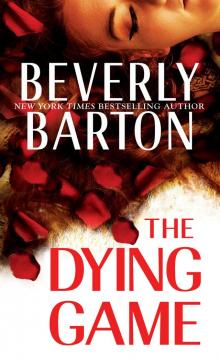 The Dying Game
The Dying Game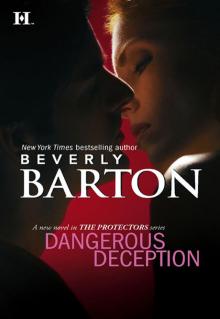 Dangerous Deception
Dangerous Deception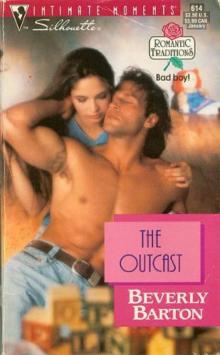 The Outcast tp-3
The Outcast tp-3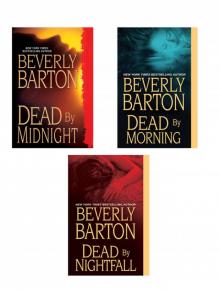 Beverly Barton Bundle
Beverly Barton Bundle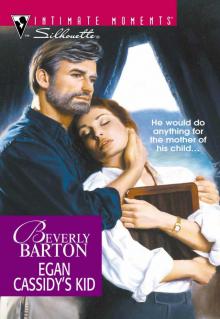 Egan Cassidy's Kid
Egan Cassidy's Kid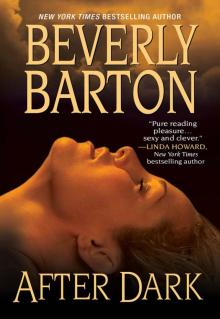 After Dark
After Dark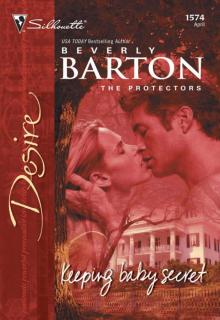 Keeping Baby Secret
Keeping Baby Secret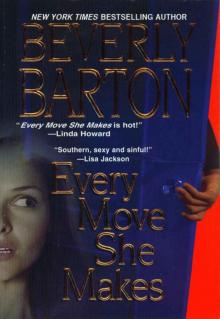 Every Move She Makes
Every Move She Makes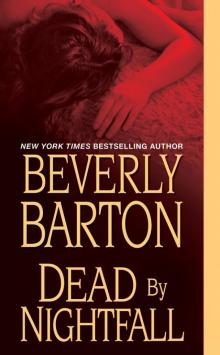 Dead By Nightfall
Dead By Nightfall As Good As Dead (Griffin Powell Book 4)
As Good As Dead (Griffin Powell Book 4)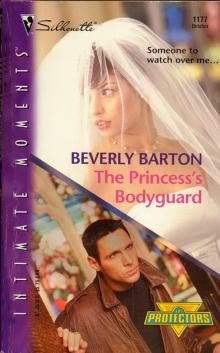 The Princess's Bodyguard
The Princess's Bodyguard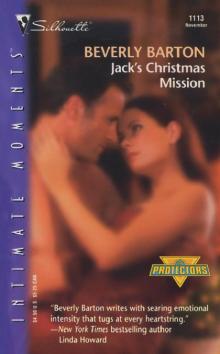 JACK'S CHRISTMAS MISSION
JACK'S CHRISTMAS MISSION In the Arms of a Hero
In the Arms of a Hero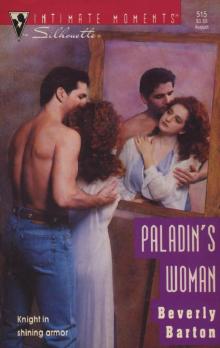 PALADIN'S WOMAN
PALADIN'S WOMAN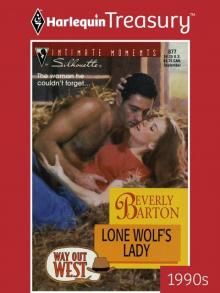 Lone Wolf's Lady
Lone Wolf's Lady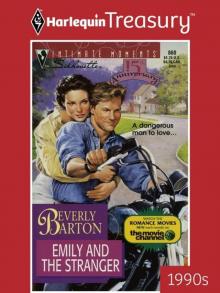 Emily And The Stranger
Emily And The Stranger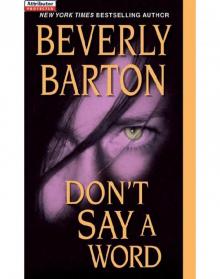 Don't Say a Word
Don't Say a Word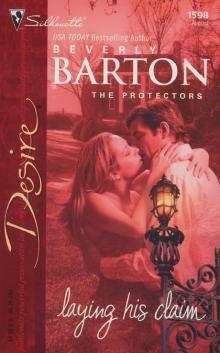 LAYING HIS CLAIM
LAYING HIS CLAIM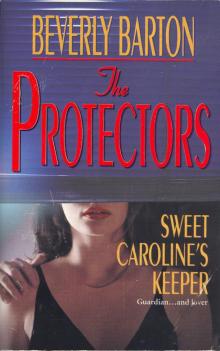 Sweet Caroline's Keeper
Sweet Caroline's Keeper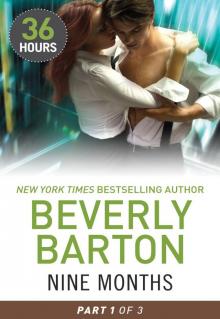 Nine Months Part 1 (36 Hours)
Nine Months Part 1 (36 Hours)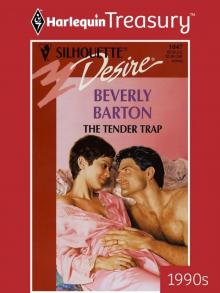 The Tender Trap
The Tender Trap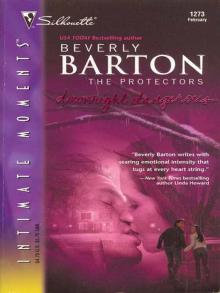 Downright Dangerous
Downright Dangerous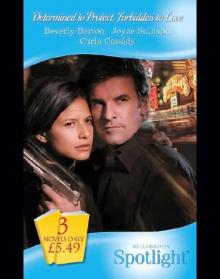 Determined to Protect, Forbidden to Love
Determined to Protect, Forbidden to Love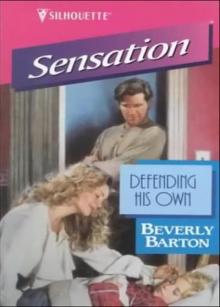 DEFENDING HIS OWN
DEFENDING HIS OWN Lone Star Country Club: The Debutantes
Lone Star Country Club: The Debutantes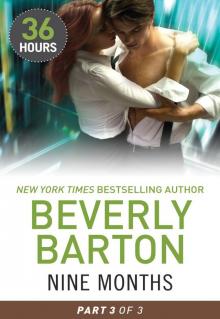 Nine Months Part 3 (36 Hours)
Nine Months Part 3 (36 Hours) Coldhearted
Coldhearted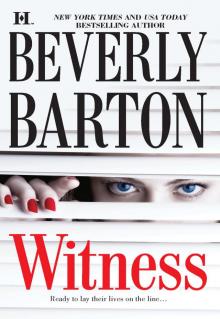 Witness
Witness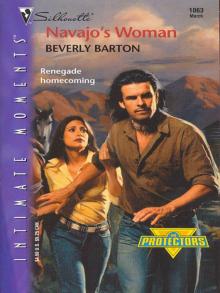 Navajo's Woman
Navajo's Woman GABRIEL HAWK'S LADY
GABRIEL HAWK'S LADY Faith, Hope and Love
Faith, Hope and Love 12 Stocking Stuffers
12 Stocking Stuffers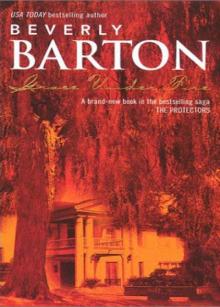 Grace Under Fire
Grace Under Fire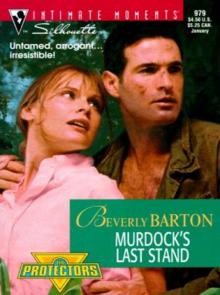 MURDOCK'S LAST STAND
MURDOCK'S LAST STAND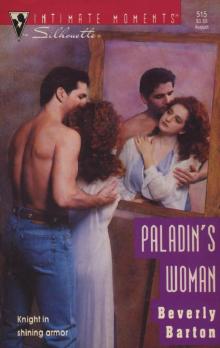 Paladin's Woman tp-2
Paladin's Woman tp-2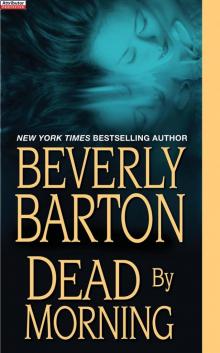 Dead By Morning
Dead By Morning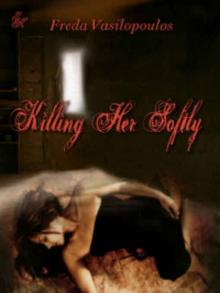 Killing Her Softly
Killing Her Softly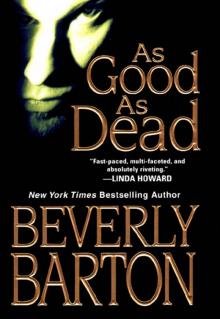 As Good as Dead
As Good as Dead Amnesia
Amnesia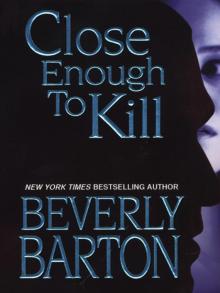 Close Enough to Kill
Close Enough to Kill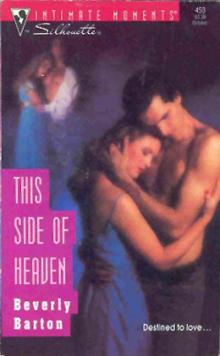 This Side of Heaven tp-1
This Side of Heaven tp-1 Her Secret Weapon
Her Secret Weapon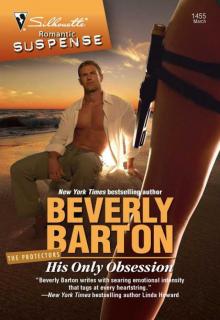 His Only Obsession (Protectors #27)
His Only Obsession (Protectors #27)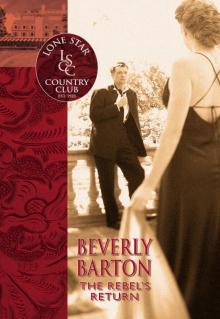 The Rebel's Return
The Rebel's Return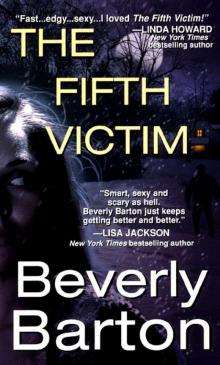 The Fifth Victim
The Fifth Victim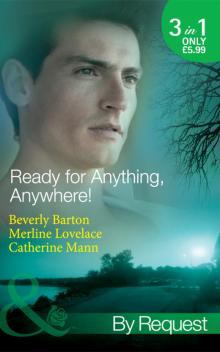 Ready for Anything, Anywhere!
Ready for Anything, Anywhere!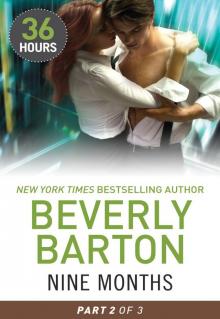 Nine Months Part 2 (36 Hours)
Nine Months Part 2 (36 Hours)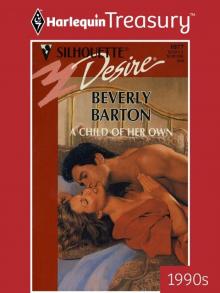 A Child of Her Own
A Child of Her Own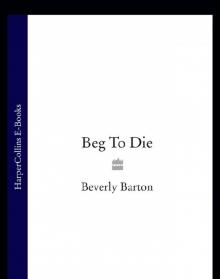 Beg to Die
Beg to Die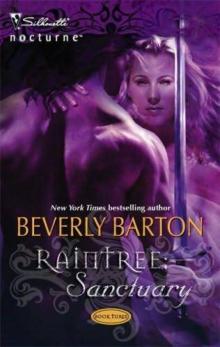 Raintree: Santuary
Raintree: Santuary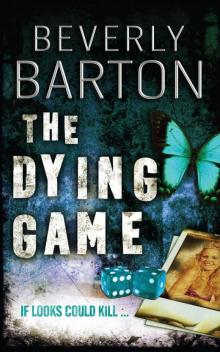 Beverly Barton 3 Book Bundle
Beverly Barton 3 Book Bundle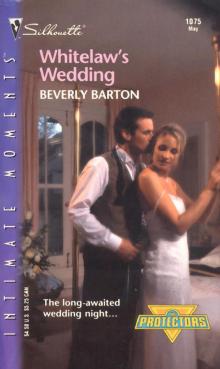 WHITELAW'S WEDDING
WHITELAW'S WEDDING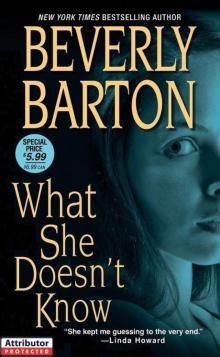 What She Doesn't Know
What She Doesn't Know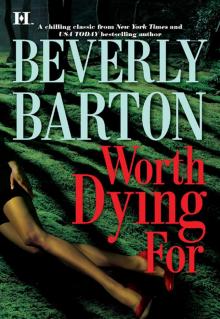 Worth Dying For
Worth Dying For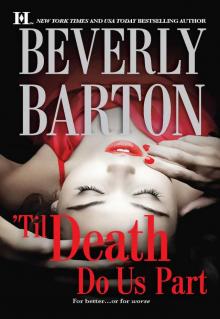 Til Death Do Us Part
Til Death Do Us Part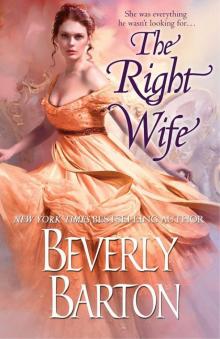 The Right Wife
The Right Wife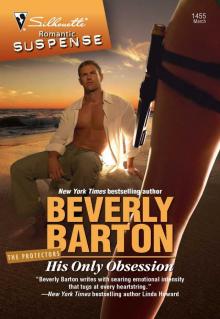 His Only Obsession (Protectors Book 27)
His Only Obsession (Protectors Book 27)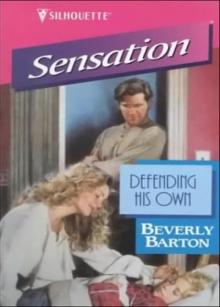 Defending His Own tp-4
Defending His Own tp-4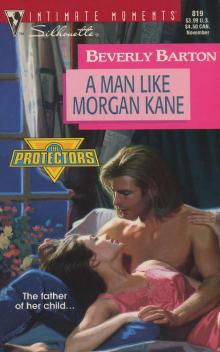 A MAN LIKE MORGAN KANE
A MAN LIKE MORGAN KANE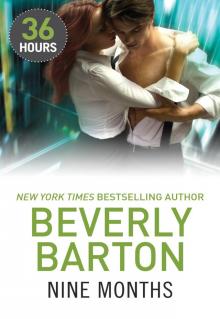 Nine Months
Nine Months If Looks Could Kill
If Looks Could Kill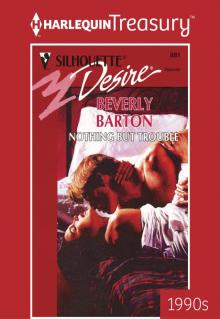 Nothing but Trouble
Nothing but Trouble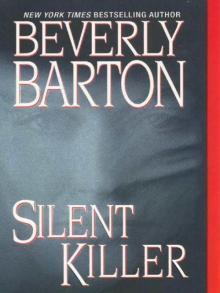 Silent Killer
Silent Killer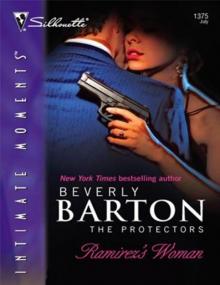 RAMIREZ'S WOMAN
RAMIREZ'S WOMAN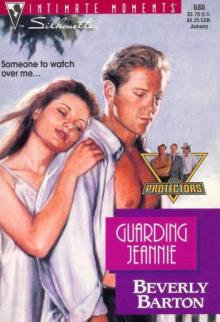 Guarding Jeannie tp-5
Guarding Jeannie tp-5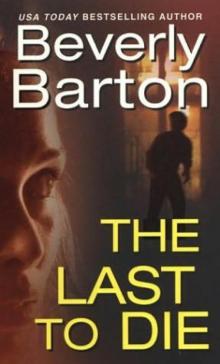 The Last To Die
The Last To Die